
Asterias is a genus of the Asteriidae family of sea stars. It includes several of the best-known species of sea stars, including the (Atlantic) common starfish, Asterias rubens, and the northern Pacific seastar, Asterias amurensis. The genus contains a total of eight species in all. All species have five arms and are native to shallow oceanic areas of cold to temperate parts of the Holarctic. These starfish have planktonic larvae. Asterias amurensis is an invasive species in Australia and can in some years become a pest in the Japanese mariculture industry.
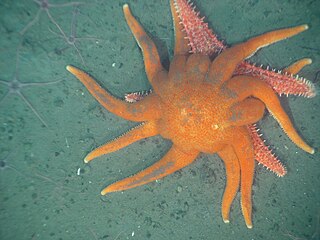
The Valvatida are an order of starfish in the class Asteroidea, which contains 695 species in 172 genera in 17 families.

Mediaster aequalis is a species of sea star in the family Goniasteridae. It is native to the west coast of North America, ranging from Alaska to California. It is found in various habitats including beaches during very low tides, and at depths down to about 500 m (1,600 ft). Also known as the vermilion sea star, it is the type species of the genus Mediaster and was first described in 1857 by the American zoologist William Stimpson.
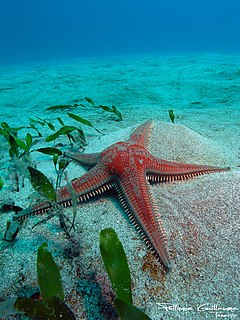
Astropecten is a genus of sea stars of the family Astropectinidae.

Coscinasterias is a genus of sea stars of the family Asteriidae.

Caecum is a genus of minute sea snails, marine gastropod micromolluscs or micromollusks in the family Caecidae or blind shells.
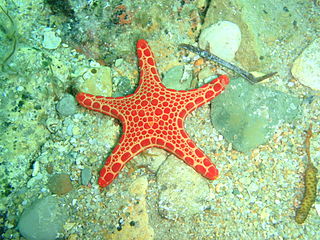
Goniasteridae constitute the largest family of sea stars, included in the order Valvatida. They are mostly deep-dwelling species, but the family also include several colorful shallow tropical species.

Halocynthia is a genus of ascidian tunicates in the family Pyuridae. Species such as H. roretzi are used as food.
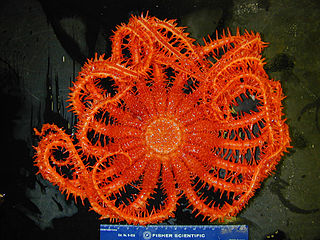
The Brisingids are deep-sea-dwelling starfish in the order Brisingida.

Pleurotomella is a genus of sea snails, marine gastropod mollusks in the family Raphitomidae.

Henricia is a large genus of slender-armed sea stars belonging to the family Echinasteridae. It contains about fifty species.
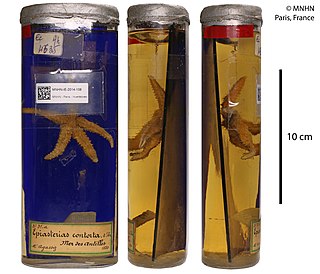
Sclerasterias is a genus of starfish in the family Asteriidae. Adult individuals have five arms but small, immature individuals have six. This led to the giving of a separate generic name to the juveniles, Hydrasterias, before it was realised that only one genus was involved. These young individuals often undergo fissiparity. The disc splits into two parts, each bearing three arms, and new arms develop on each part to complete the complement of arms. This sometimes happens repeatedly and may be an adaptation to life in cold, deep seas where most of the species are found.

Odontaster is a genus of sea stars. The type species is Odontaster hispidus.

Leptasterias is a genus of starfish in the family Asteriidae. Members of this genus are characterised by having six arms although five-armed specimens sometimes occur. L. muelleri is the type species. The taxonomy of the genus is confusing and Leptasterias hexactis seems to be a species complex. Some species brood their eggs.

Evasterias troschelii is a species of starfish in the family Asteriidae. Its common names include the mottled star, false ochre sea star and Troschel's true star. It is found in Kamchatka and the north western coast of North America.

The Brisingidae are a family of starfish found only in the deep sea. They inhabit both the Atlantic and Pacific Oceans at abyssal depths, and also occur in the Southern Ocean and around Antarctica at slightly shallower depths.
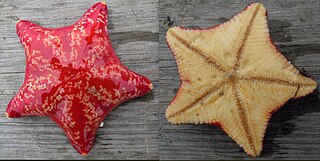
Poraniidae is a family of starfishes in the order Valvatida.

The Freyellidae are a family of deep-sea-dwelling starfish. It is one of two families in the order Brisingida. The majority of species in this family are found in Antarctic waters and near Australia. Other species have been found near New Zealand and the United States.
Brisinga is a genus of starfish in the family Brisingidae. The species in this genus are primarily found in deep sea habitats.

Freyella is a genus of deep-sea-dwelling starfish in the order Brisingida.


















